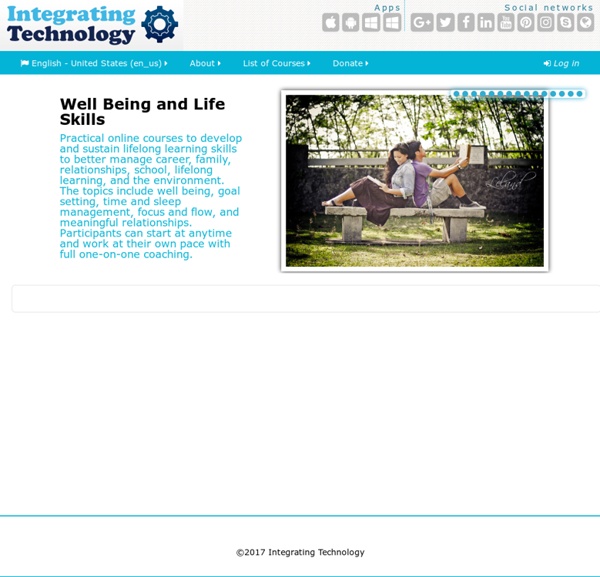



http://www.integrating-technology.org/
Blog It’s funny, because the more successful your school, the less time you’ll actually have to listen to your students. Language schools rely very much on volume. Groups have a minimum requirement size, and anything on top is usually margin. So often it’s a “let’s pack in the students and worry about the rest later” mentality. The same is true of good marketing.
How to Study Less by Learning Things Once You read over your notes. Then you read them over again. Then you read them over a third time. Then you take the test and are surprised at just how much you missed. Despite reading everything three times! A lot of study time is wasted because of one problem: you fail to learn things the first time around. Teacher Training: Web Resources for Staff Development A first year teacher feels overwhelmed. A principal needs an evaluation rubric for integrating technology. You're looking for a listing of summer workshops for teachers in your area. Where do you turn? Included: More than a dozen professional development resources for staff developers, new teachers, experienced teachers... How to Let Go of Anger and Embrace Forgiveness 19EmailShare This sixth article in the series comes from my friend Lynn from Back to the Garden. Lynn is a certified health and nutrition coach as well as a photographer that aims to see the good in everyone.
edWeb.net - Cookies Required Check out one of our most popular webinars below! Emerging Tech is a professional learning community (PLC) where school librarians can explore all the ways to integrate technology and 21st century learning into school library programs. The community hosts free monthly webinars and live chats presented by Michelle Luhtala, Head Librarian at New Canaan High School (CT). Online discussions provide an easy way to continue the conversation and share ideas and experiences with peers across the country, and around the world. You'll have an opportunity to collaborate with other librarians as you learn about and explore the many uses of technology in school libraries.
Why I've Decided To Stop Comparing Myself To Others Many people I know slave to the comparison game. I’m not as thin as so and so; I’m not as tall or as pretty. I’m not as wealthy as she or he is. I’m not as strong or as flexible. Podcast 434: Discovering Useful New Ideas as a Connected Educator (October 2015) This podcast primarily features a recording from the October 22, 2015, OACTE, OEQA, OATE Fall Conference in Edmond, Oklahoma, held at the University of Central Oklahoma. The recorded session was my breakout presentation titled, “Discovering Useful New Ideas as a Connected Educator: Tips for Using Flipboard, Pocket, Twitter and Nuzzel.” Check out the podcast shownotes for links to my presentation slides (shared as a Google Presentation) and other referenced links and videos.
Change A Habit In Three Steps With This Flowchart I'm going to promote your comment by way of calling you out for being a bullshitter extraordinaire. Nicotine is one of the most famously addictive substances known. There are many cases reported of people who were told they had cancer, were on drugs and treatment to help them fight cancer, and yet could not stop smoking tobacco. The BBC had a documentary about this phenomenon at least 15 years ago. Training materials At this page you can find several recourse for teachers' professional development. Some of them can be used as a self-study material or by teacher trainers who wish to these materials as part of their courses for teachers. Learning Snacks - do it yourself! In the following links you find resources and self-learning materials on different topics. It includes videos, recorded webinar sessions, publications, etc.
Five ‘Get Out of Your Own Way’ Leadership Skills from Aikido I think there are a few things in Aikido that are important to remember: 1) for every tenkan there is an irimi: Aikido is known, superficially, primarily for it's turning nature. however, for most techniques there is an entering and a turning version. While it is tempting to think of every interaction as a harmonious blending, there are times when you must enter straight into your partner. This too is harmonious but requires commitment. 2) The easy part, sometimes, is to empathize with your partner. You also have to have a firm understanding of what and who you are.